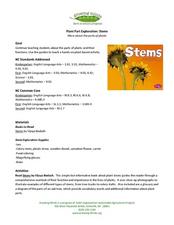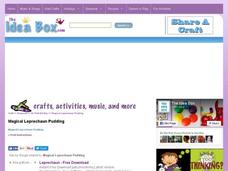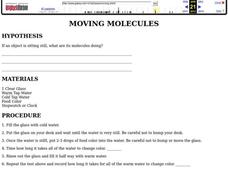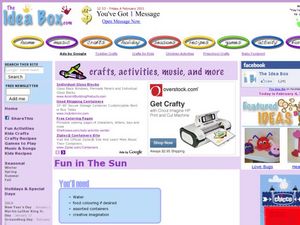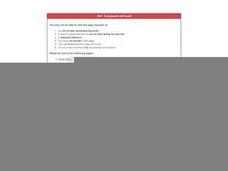Curated OER
Plant Part Exploration: Stems
Explore water transport in plant stems using this fun experiment! Your scientists will start by reading Stems by Vijaya Bodach. Then, activate prior knowledge about plant stem functions and water transportation. Demonstrate this concept...
Chymist
The Extraction and Identification of Artificial Food Colors
Did you know some food dyes are considered safe while others are considered carcinogenic? During the experiment, young chemists extract artificial food colors from prepared foods. Then, they use chromatography paper to identify which...
Curated OER
Food Science, Scientific Method: Reliability and Validity in Empirical Research
Secondary learners explore food science by conducting an experiment using the scientific method and creating a science fair project based on their findings. They learn about food technology and modern research development. They...
Curated OER
Winter Ice Candles
Students make ice candles. In this art lesson, students fill a balloon with water, add a drop of food coloring, and blow into the balloon and tie a knot in the balloon. Students then put the balloon in the margarine tub and put...
Curated OER
Rainbow Toast
Students paint on bread using milk and food coloring. In this art lesson, students use their imagination and "paint" something on the bread.
Curated OER
Bubble Bubble Pop Pop!
Students pour bubble solution in pans and add different colors of food coloring to each pan. In this art lesson, students dip their bubble wand into the pan and blow bubbles onto the paper. Students use all of the colors making a...
Curated OER
Model of a Well
Students complete an experiment using wire screening, wires, water, sand, and food coloring to compare the relationship of groundwater to wells. In this water lesson plan, students observe and record what they see after they complete the...
Curated OER
Color Splash
Students investigate density. In this density lesson, students conduct an experiment using food coloring. Students observe the differences in mixing food coloring in water and oil.
Curated OER
Spring Butterflies
Students create Spring butterflies. In this art activity, students use coffee filters to make butterflies. Students add food coloring and water together for paint. Students use an eyedropper to drop the colors onto the filter. Allow the...
Curated OER
Sugar Cube Castles
Students build a castle or igloo. In this art lesson, students mix icing sugar with water and food colouring to make a paste preparing a firm base and then use the paste to stick the sugar cubes together.
Curated OER
Magical Leprechaun Pudding
Students make a snack for St. Patrick's Day. In this art and science lesson, students put some vanilla pudding in a ziploc bag, add drops of yellow and blue food coloring, and mix it with the pudding changing the color before the...
Curated OER
ABC Toast
Students use a little milk mixed with food coloring to paint on the first letter of each child's name, their whole name, or another letter of their choice. In this art lesson, students butter the bread and sprinkle it with cinnamon-sugar...
Curated OER
Ice Eggs
Students melt colored ice cubes which are created from a funnel, balloons, water, and food coloring. In this ice lesson plan, students put food coloring into water in a balloon, freeze it, and see how the food coloring ended up making...
Curated OER
Make A Thunderstorm!
Students create a thunderstorm by putting ice cubes and food coloring into a container and observe what happens to the food coloring. In this thunderstorm lesson plan, students discuss the cause and effects of thunderstorms and then...
Curated OER
Make a thermometer
For this thermometer worksheet, students make a thermometer out of a straw, juice bottle, food coloring and more. Students also answer 3 questions about it.
Curated OER
Moving Molecules
In this moving molecules worksheet, students use water and food coloring to see how long it takes for the molecules in the water to change color. Students follow 6 directions and reflect on what they saw.
Curated OER
Molecules on the move
In this molecules worksheet, students add food coloring to water and heat it up and answer questions about their findings. Students answer 4 questions about heating molecules.
Curated OER
Capillary Action
In this capillary action worksheet, learners follow directions to see the ability of liquids being drawn up into small spaces using beakers, paper, rulers, food coloring and more. Students follow 8 sets of directions and write a conclusion.
Curated OER
Hot and Cold Colors
Students explore the effect of heating and cooling on the dispersal of food coloring in water.
Curated OER
Colorful Clouds
Students create colorful clouds out of shaving cream and a drop of food coloring in ziploc bags. In ths art lesson, students enjoy squishing the shaving cream making it colorful.
Curated OER
Fun in the Sun
Students freeze colored water. In this art lesson, students take the blocks of ice out of the freezer, put the blocks into a small pool and watch the ice melt.
Curated OER
Parts Per Million
Pupils perform serial dilution of food coloring experiment with partner, examine concentration levels, and differentiate parts per million (PPM) and parts per billion (PPB). Students complete pre-lab and post-lab questions and data table.


